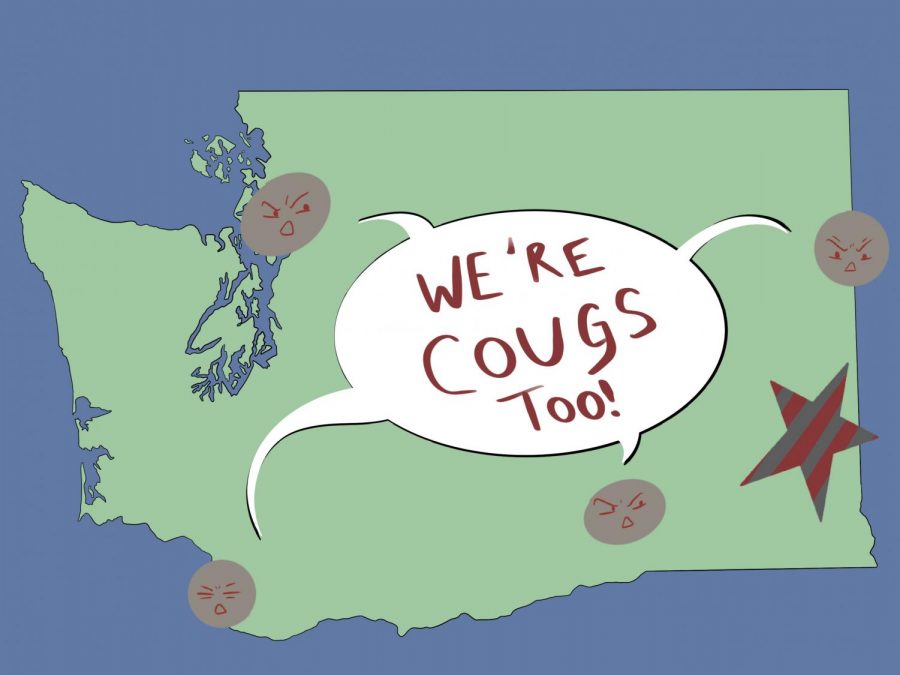WSU more than just Pullman campus
All five campuses deserve equal respect, representation
When you hear “WSU,” you probably only think of Pullman, neglecting the four other campuses that help make this university community unique.
September 13, 2021
When I was in the Running Start program at WSU Tri-Cities in Richland, I heard a lot about the four other WSU campuses in Vancouver, Spokane, Everett and, of course, Pullman. It made me feel like I’m part of a sprawling, statewide community.
I arrived on the Pullman campus in the fall of 2020. It was a completely different world – like WSU was consolidated only here, inexplicably linked to the city of Pullman somehow.
If the other campuses were mentioned, it was in passing or to boast of our university’s statewide prowess – nothing about their actual accomplishments.
Did you know WSU Spokane is one of the premier leaders in sleep research in the country? Or that WSU Tri-Cities has over $23 million worth of resources for research in and production of wine?
Probably not if you have only attended the Pullman campus. It is time we start acknowledging and celebrating our smaller campuses in Spokane, Everett, Vancouver and Richland.
Travis Myers, WSU Tri-Cities senior mechanical engineering major, said that part of that should include making sure students at the smaller campuses have the opportunity to be actively involved in WSU Athletics.
“The one college experience I would like to have is to go to sporting events,” Myers said. “But to my knowledge, I don’t know of any direct connection between Tri-Cities and Pullman, like things like a bus to hop on and go hang out at a football game.”
In some university systems, such as the University of California system, the individual schools are so large that each of them has their own athletic teams.
For WSU, where the secondary campuses are so much smaller and do not warrant their own sports teams, it is disappointing that there is not a way for students outside Pullman to be involved in athletics other than watching games on TV like the rest of the world.
If a bus system, as Myers proposed, is not feasible, another great way to help students from the smaller campuses feel more included could be systemwide watch parties of major sporting events. That way, students from every campus have the chance to connect and get involved.
Myers also suggested a similar system for other extracurriculars, such as band or choir performances.
For other students like Alison Fellman, WSU Tri-Cities junior social sciences major, campus connectivity should mean more access to Pullman’s wider array of academic options.
“For example, I’m majoring in the social sciences and I wish I had a few more course options, as my impression so far is that the focus of the Tri-Cities campus is less on the social sciences and humanities and more on agricultural fields like viticulture,” she said.
Although academic options have been expanding, the smaller WSU campuses tend to have specific academic focuses, usually based on the city they are in.
The Tri-Cities, Everett and Vancouver campuses all have heavy focuses on different types of engineering, and the Spokane campus is actually designated as the university system’s primary health sciences campus. While these niches are not inherently bad, they can be extremely limiting for students searching for the smaller campus experience but interested in majors like social sciences or the arts.
Myers said while classes were online during the pandemic, students from the smaller campuses actually had access to some of the classes that were previously taught exclusively in Pullman.
“It honestly was a really, really cool opportunity, and I would like to see that continued because that felt more included as a whole campus rather than just, ‘Oh, this is the Tri-Cities campus and you can only take classes at the Tri-Cities campus,’” he said.
Although WSU does offer something like this already through Global Campus, post-COVID-19 it could be even better to allow some limited enrollment options for Pullman classes.
That would allow students from other campuses to tune in online for lectures and complete their work alongside the rest of the class as scheduled.
Both Fellman and Myers agreed this could be a great avenue for furthering campus unity and connectivity, and I believe it is a great way to expand academic opportunity for students at the smaller campuses.
However, as with so many things, experiences often come down to the individual students. This issue of campus unity is no different.
Myers said he feels like WSU Tri-Cities is very much its own school. Because of a lack of inclusion in WSU Athletics and other extracurriculars, he feels disconnected from the larger WSU system.
“I’m definitely in more of the department of, [we are] separate schools that share a mascot,” Myers said.
Fellman, however, reported a pretty different experience.
“I initially felt like the Tri-Cities campus was sort of its own entity,” she said. “But the more I learn about it and get involved, I do feel like there is unity, mostly to the credit of the staff.”
Still, when someone says “WSU,” what do you think of? Pullman, right?
WSU has taken steps to attempt to make campuses feel more unified with their One WSU initiative, which has implemented changes like making every degree a WSU degree without regard to the campus at which it was obtained.
However, it is clear based on testimony from students like Fellman and Myers that symbolic gestures like One WSU – which is a set of standards and principles for all WSU campuses to follow in order to attempt to create a more unified system – are not enough to unite the university under one system.
WSU Pullman must find ways to include students from our smaller campuses in our academics, athletics and extracurriculars.
WSU is so much more than the Pullman campus. Students at the Tri-Cities, Everett, Spokane, Vancouver and Global campuses are Cougs just as much as students are here in Pullman.
It is time to change our idea of what WSU is by celebrating our smaller campuses and finding ways to include students from those campuses in the larger WSU system.











Brenda Alling • Sep 13, 2021 at 3:29 pm
Kestra,
Thank you for writing about all WSU campuses. I am the director of marketing and communication at WSU Vancouver. Did you know that WSU has always offered one degree across all campuses? It’s not new and it is different from the University of Washington campuses. I think students, families and employers appreciate one degree. I’d also like to share that WSU Vancouver typically takes a bus of students to Pullman for a football game each year. VanCougs really look forward to that weekend event. I wonder what takes place on WSU Tri-Cities, Vancouver, Spokane and Everett campuses that Pullman student might like to attend? I am happy to serve as a resource if you write a follow up piece.
All WSU campuses have amazing students and faculty with unique areas of study and stories to tell. Anything we can do together to unite as ONE WSU is worth pursuing.